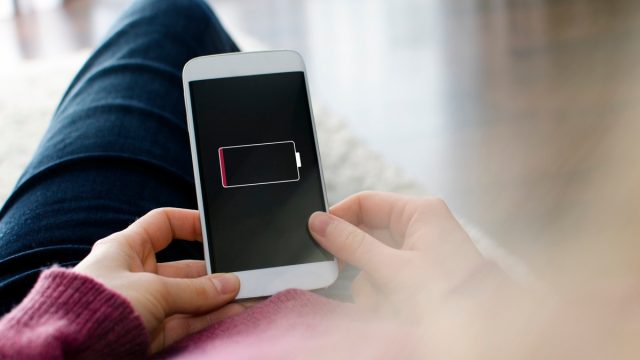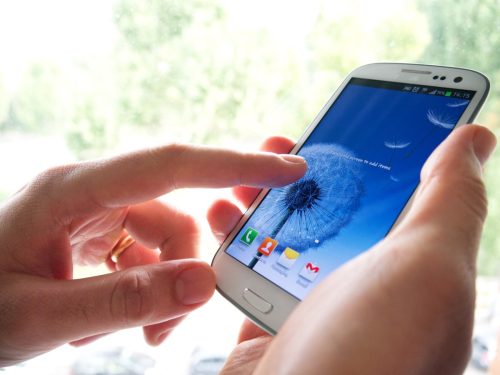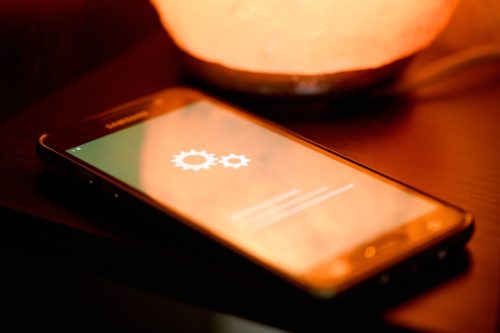If Your Android Battery Is Suddenly Draining, This Could Be Why

It feels like our Android phone batteries always die at the worst times. You’re trying to find directions in an unfamiliar city, or on the phone with a friend you haven’t talked to in years—suddenly, your battery percentage is in the single digits. If you’re an Android owner, this could be happening to you more often than expected, and faster than it should be. Read on to learn one common reason your Android battery is draining so quickly.
READ THIS NEXT: If You Have an Android, You’ll Be Barred From Doing This, Starting in August.
Android users have been on high alert lately.

Security threats have plagued Android users, with Google issuing safety warnings and taking swift action when new breaches are discovered. On March 25, Google banned dozens of apps from its Google Play marketplace after learning that developers had designed them to collect and transmit user’s data without their knowledge.
Another threat was discovered in May, when cybersecurity firm Kaspersky identified three apps in the Google Play store that contained Trojan-style hacker software called “Jocker.” Although Google has banned apps with this code, malware somehow still made it through. Malicious apps are nothing new, but they can be sneaky, and you might not even know that your Android is infected. In that case, your battery may be trying to send you signs that your phone is at risk.
Something sneaky could be causing your battery to drain and die.

There are several factors that could cause your Android battery to die, with many as trivial as having your screen brightness too high. But if you notice that your Android battery is draining at a quicker rate than it normally does, it might be a sign of something more sinister. Your phone may be infected with malware, as reported by CNET, which is a tool used by hackers to access information and capabilities on your phone.
One way that malware can make its way onto your phone is by downloading a malicious app, which will ask you for certain permissions when it’s installed on your phone.
This happened recently with an Android app called Ads Blocker, CNET reported, which was supposed to do just as its name says and block ads. Unfortunately, the app was actually “adware” in disguise, running in the background and showing users more ads instead of fewer.
A draining battery isn’t the only sign your phone is infected.

A draining battery is a telltale sign of potential malware—as the malware is using power without your knowledge—but it’s not the only one. According to CNET, you may notice constant ads or apps you don’t recognize on your phone. If you install an app and the icon disappears without warning, you could be in trouble.
You may also get a warning in the form of ransomware, which is never a good sign. In this instance, you will see that hackers have locked your information. Most times, according to CNET, you will get a popup from the attacker asking for Bitcoin—a form of electronic currency—to get your files back.
RELATED: For more up-to-date information, sign up for our daily newsletter.
Here’s what to do if you suspect your phone is infected with malware.

Dealing with malware is both scary and inconvenient. If you suspect something is amiss with your Android, try deleting the app to resolve the issue. If the app won’t budge, you’ll want to seek out expert advice to determine the best way to get it cleared from your phone.
To investigate existing apps, check out the permissions, which is what apps are allowed to do and access on your phone. You can do this by heading to the Settings app, tapping an app, and then Permissions. You’ll want to check and see if any apps have permission to do something they shouldn’t, like sending text messages, Adam Bauer, security researcher for mobile security company Lookout, told CNET.
You can also take preventative steps.

To keep your device protected, make sure you have the latest software downloaded on your Android phone. Updates often include patches that “cut off the access the malicious software once enjoyed,” CNET reported, and updated software can work preventatively as well.
You can check to see if your Android is up to date by opening the Settings app, tapping System, then System update. You should then see your Android version and Android security update. Making it even easier, Google will send a notification when updates become available for you.
Using antivirus apps can also be a beneficial tool, as they identify malware and provide customer service when you need it. In general, when you are downloading apps, be sure that you are only getting them from the official Google Play Store. Apps that come from third-party stores aren’t vetted by Google and could be dangerous to download.
READ THIS NEXT: Google Just Issued Another Urgent Warning to All Android Users.